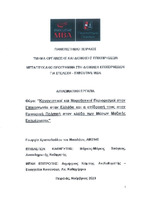Κανονιστικοί και νομοθετικοί περιορισμοί στην επικοινωνία στην Ελλάδα και η επίδρασή τους στην εμπορική πολιτική στον κλάδο των μέσων μαζικής ενημέρωσης

View/
Keywords
Advertisement ; Media ; RestrictionsAbstract
Defining a normative framework in an area of conflicting individual freedoms, such as the field of advertising and communication, has always been difficult. Despite the adoption of rules in the field of advertising in our country, even before the Armed Forces' television stations started operating and the multitude of laws and decisions regulating every detail of how to promote and advertise products and services through the printed and broadcast media, the rapid development of technology and the prevalence of new means of communication and more effective methods for faster penetration and greater public appeal, makes constant and urgent the need to adapt the "legal order" to which the media and advertisers must comply.
The entire marketing sector, the commercial departments of advertisers and the media sector in general, are obliged to 'adapt' the creative and promotional aspect of each communication to rules which they may consider inadequate, ineffective or sometimes even contrary to the rules of free competition, given the parallel operation of the ‘freer’ Internet, for which the restrictions are less stringent and the control mechanisms do not have the same reflexes. If the landscape were uncharted, would the situation be anarchic and would we be bombarded by potentially harmful advertisements such as cigarettes, alcoholic beverages or even illegal betting companies?
The purpose of this thesis is, on the one hand, to systematically document the legislative and regulatory framework in our country, regarding advertising and communication in general in traditional media and, on the other hand, to examine the degree of influence of the restrictions introduced by the legislative and regulatory framework and, on the commercial policy of companies that operate and manage broadcast and print media.
In conclusion, an attempt is made to discern through recording and research: a. the degree of knowledge of the existing legislation and rules of ethics and self-regulation by the relevant managers; b. the judgement of the directly affected economic operators on the existing legislative and regulatory framework in terms of its influence on their decision making regarding their commercial and marketing policies as well as their creativity; and c. the estimated forecast of the potential future reduction in revenue in traditional instruments as a consequence of the obligation to comply with the rules.

